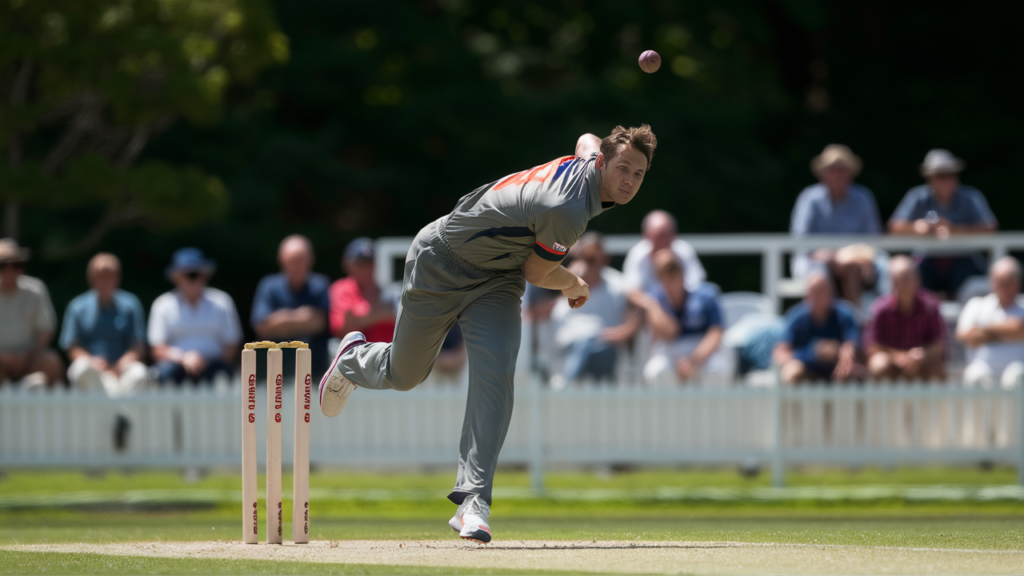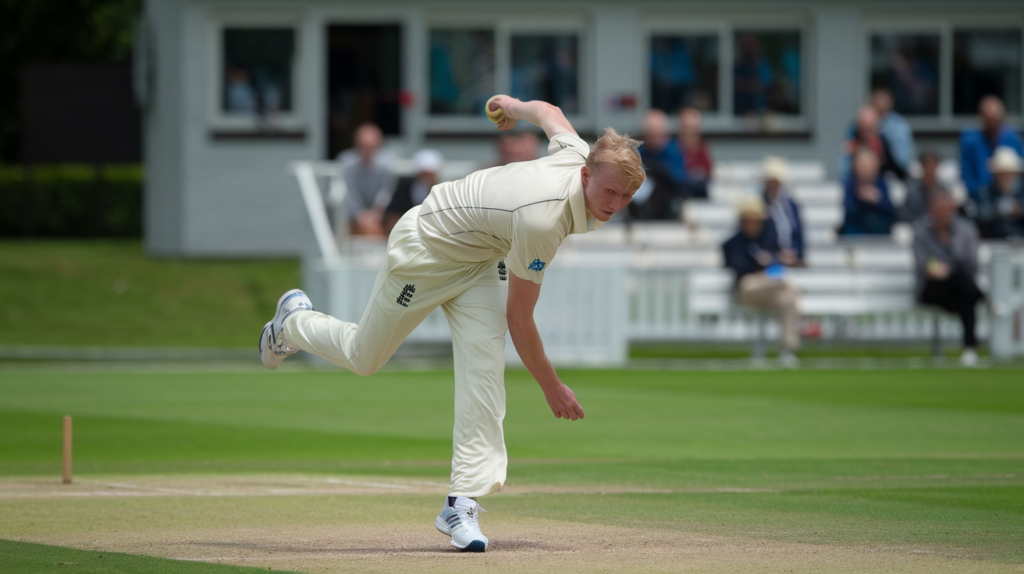Introduction: Why Spin Bowling is the Game-Changer in Cricket
Spin bowling techniques is like magic on a cricket field. Whether you’re a young cricketer looking to find your niche or an experienced player refining your craft, mastering spin bowling can give you an edge like no other skill in the game. The magic lies in deceiving batsmen, turning the ball when they least expect it, and delivering those crucial breakthroughs that can win matches.
While pace bowlers often hog the limelight for their speed, it’s the spinners who often have the last laugh in the longer formats. Did you know that 40% of all wickets in test matches between 2010 and 2020 were taken by spin bowlers? This tells you how pivotal they are, especially in conditions that favor them. And with more spin-friendly pitches being prepared around the world, there has never been a better time to master this art.
In this guide, we’ll explore everything you need to know about becoming a spin wizard—from the types of spin bowling and core techniques to tactical play and conditioning. Whether you’re an off-spinner or a leg-spinner, this article will give you a deep dive into the skills and strategies you need to conquer the game.

The Foundations of Spin Bowling: Types and Variations
Before jumping into the tactics, let’s start with the basics—what exactly is spin bowling? At its core, spin bowling is about using the fingers or wrist to rotate the ball, making it deviate off the pitch after it bounces. This deviation—commonly called “turn”—makes it difficult for batsmen to predict where the ball will go.
Off-Spin Bowling: Finger Magic
Off-spin is typically bowled by using the fingers to rotate the ball, making it spin from a right-handed batsman’s off-side (away from the body) to the leg-side (towards the body). If you’ve ever watched Ravi Ashwin bowl, you’ve seen off-spin in its most lethal form.
- Key Skill: Finger strength and precision.
- Example: Harbhajan Singh’s famous “doosra” is an off-spin variation that turns the opposite way, confusing batsmen.
- Actionable Tip: Practice spinning the ball with your fingers while focusing on controlling the flight. A good off-spinner knows when to use subtle variations in speed and bounce to keep the batsman guessing.
Leg-Spin Bowling: The Wrist-Spinner’s Weapon
Leg-spin is arguably the most challenging type of bowling to master. Here, the ball spins from the leg-side to the off-side for a right-handed batsman. It’s the art of deception—where small wrist movements create big results.
- Key Skill: Wrist flexibility and rotation.
- Example: Shane Warne’s legendary “ball of the century” to Mike Gatting perfectly illustrates the magic of leg-spin. Warne flicked the ball with his wrist, making it drift in the air before turning sharply.
- Actionable Tip: Spend time perfecting the flick of your wrist. Start slow, and gradually increase your speed. Once you master the leg-break, add variations like the googly to keep your opponent on their toes.
The Variations: What Sets You Apart
Every great spinner has a bag of tricks. If a batsman can read your every move, you lose your advantage. So, what are the key variations you need to master?
- The Googly: A leg-spinner’s surprise delivery that turns in the opposite direction of a typical leg-break.
- The Doosra: An off-spinner’s counter move that spins the other way, often confusing even the best batsmen.
- The Flipper: A leg-spin delivery that skids after it bounces, often bowled faster to surprise the batsman.
Mastering the Core Techniques: Grip, Run-up, and Release
Now that we’ve covered the types and variations of spin bowling, let’s dive into the techniques that will turn you into a genuine threat on the field.
The Grip: Where the Magic Begins
Your grip on the ball is crucial. For off-spinners, the grip involves using your index and middle fingers to roll the ball, while leg-spinners rely on their wrist and a special grip to rotate the ball.
- Key Tip: Don’t grip the ball too tightly. Keep a firm but flexible hold, as over-gripping can reduce the amount of spin you generate.
Run-Up: Building Momentum Without Speed
Unlike pace bowlers, a spinner’s run-up is more about rhythm than raw speed. You’re not trying to bowl fast—you’re trying to bowl deceptively. Your run-up should be relaxed and controlled, leading to a smooth delivery.
- Common Mistake: Many young spinners rush their run-up, which leads to poor control. Slow down, and focus on accuracy over speed.
Release and Follow-Through: The Finishing Touch
The release of the ball is where you impart the spin. Whether you’re a leg-spinner flicking the ball with your wrist or an off-spinner rolling it with your fingers, the release determines how much the ball will turn.
- Key Insight: For maximum spin, aim to release the ball at the highest point of your delivery action. Follow through with your spin bowling techniques arm to maintain balance and control.
Conditions That Benefit Spin Bowling
Understanding the Pitch
Spinners thrive on certain types of pitches, particularly those that are dry, dusty, or cracked. These surfaces help the ball grip and turn more, giving spinners a significant advantage.
- Data Insight: On average, spinners take 30% more wickets on subcontinental pitches compared to faster, bouncier surfaces like those in Australia (Source: CricViz, 2023).
Weather Conditions and Their Impact
Hot, dry weather helps the pitch break down faster, which is a dream scenario for any spinner. Conversely, overcast or humid conditions can make it tougher for the ball to grip the pitch.
The Format of the Game
Spin bowling has traditionally dominated in test matches, where the longer format allows the pitch to wear down, favoring spin as the game progresses. However, spinners have also adapted to limited-overs formats by focusing on containment and using variations to outsmart aggressive batsmen.
- Pro Insight: In T20 cricket, spinners who bowl slower through the air have been found to be 20% more effective in terms of economy rate (ESPNcricinfo, 2022).

Advanced Strategies for Spin Bowling Success
Field Placement: Setting the Trap
Your field placement should reflect your bowling strategy. Close-in fielders like slips and silly point are often used to capitalize on edges, while a deep fielder may be positioned for mistimed lofted shots.
- Pro Tip: Work with your captain to set attacking fields when the pitch is offering turn. A well-set field can be the difference between a dropped catch and a match-winning wicket.
Deception: The Mental Game
A great spinner is not just a bowler; they are a strategist. Spin bowling is as much about deceiving the batsman as it is about executing the perfect delivery.
- Example: Shane Warne was known for setting up batsmen by bowling a series of deliveries that looked identical, only to deliver a sharply turning ball that would trap them.
Physical and Mental Conditioning for Spin Bowlers
Strength Training for Spinners
While you might think spin bowling doesn’t require the physical prowess of a fast bowler, building strength in your fingers, wrists, and shoulders is essential for delivering those long spells.
- Exercises: Focus on resistance training and wrist exercises. Incorporating yoga can also improve your flexibility, which helps with your bowling action and balance.
Mental Toughness
Patience is perhaps the most valuable asset a spin bowler can have. The best spinners understand that success often comes after spells of pressure-building. The ability to keep a cool head and stay focused during long spells can separate a good bowler from a great one.
People also ask
How to master spin bowling in cricket for beginners?
To master spin bowling, focus on grip, wrist position, and practice spinning the ball with variations.
How to master spin bowling in cricket easy?
For easy mastery, start with a basic grip, use a smooth wrist action, and practice different spin angles.
How to spin a Cricket Ball googly?
To bowl a googly, grip the ball like a leg-spin but use a wrist flick to turn the ball in the opposite direction.
How to bowl off spin for Beginners?
For off-spin, grip the ball with fingers across the seam, rotate the wrist inward, and spin the ball sharply off your fingers.
Conclusion:
Your Journey to Mastering Spin Bowling
Mastering spin bowling techniques is not something that happens overnight. It takes time, practice, and dedication to become a great spinner. spin bowling techniques But with the techniques, strategies, and tips outlined in this guide, you’ll be well on your way to perfecting this unique craft.
Whether you’re an aspiring cricketer or a seasoned player, focus on honing your grip, understanding the conditions, spin bowling techniques and developing mental toughness. spin bowling techniques Combine these with a deep tactical understanding of the game, and you’ll be able to turn the ball as effectively as any of the game’s legends.




